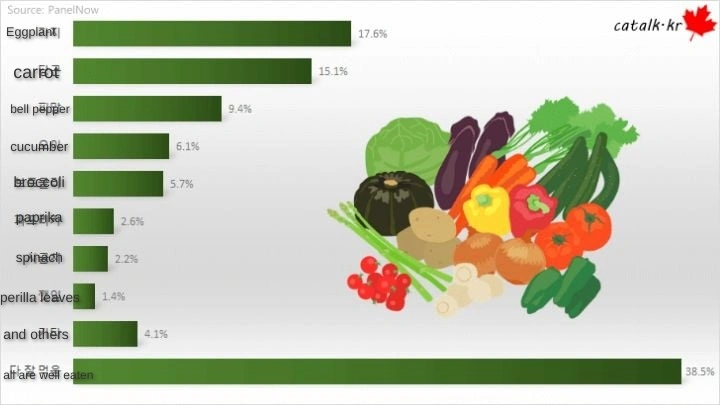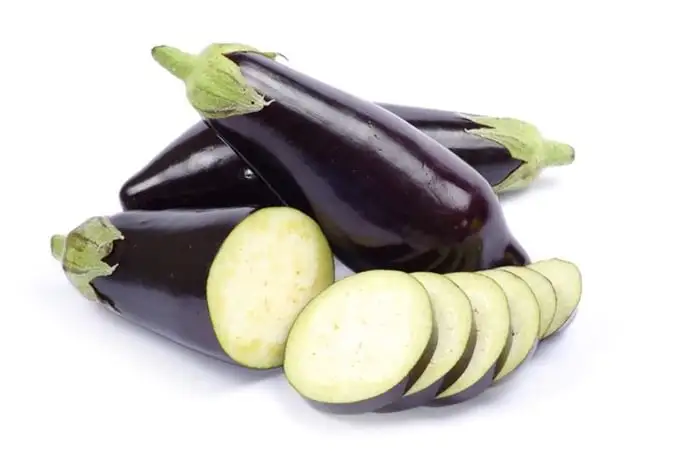A recent survey revealed eggplant as the most disliked vegetable among Koreans. However, innovative culinary creations like eggplant fritters and diverse global preparations are challenging these perceptions, suggesting that eggplant’s culinary potential remains untapped. As Korean cuisine continues to evolve, eggplant may shed its negative reputation and emerge as a beloved ingredient.
A Survey Reveals Koreans’ Vegetable Preferences

An intriguing survey has recently surfaced in Korean online communities, asking participants to identify their least favorite vegetable. The survey offered a variety of options, including eggplant, carrot, bell pepper, cucumber, broccoli, paprika, spinach, perilla leaves, and others. Among these, eggplant emerged as the top contender, earning the dubious title of the most disliked vegetable among Koreans.
Eggplant: A Culinary Nemesis
The survey results sparked a flurry of comments on the online forum Instiz, where many expressed their aversion to eggplant. The general sentiment was that eggplant remained unappealing regardless of its preparation method. Particularly, there was a strong dislike for the traditional Korean dish eggplant stir-fry (gaji namul). Many respondents shared anecdotes of disliking eggplant since childhood due to their early experiences with eggplant stir-fry. This suggests that the sensory experience of eggplant, especially in its stir-fried form, may have shaped negative perceptions among Korean individuals.
The Rise of Eggplant Fritters: A Culinary Redemption?
Surprisingly, amidst the eggplant disdain, there were also numerous comments praising eggplant fritters (gaji tteokbokki). These deep-fried eggplant dishes, often served at Chinese restaurants in Korea, are considered a delicacy. Unlike the plain Korean eggplant stir-fry, these fritters feature a savory filling of beef or pork encased within a crispy batter. This unique preparation has been gaining popularity in recent times, and some netizens even credited it with introducing them to the enjoyable side of eggplant.
Expanding Culinary Horizons: Discovering Eggplant’s Appeal
Other comments highlighted the transformative power of travel in shaping culinary preferences. Some respondents recounted their experiences in China, where eggplant is prepared in a diverse array of dishes. Exposure to these culinary creations broadened their palates and led them to appreciate eggplant’s versatility. Similarly, others mentioned discovering the joys of eggplant fritters while traveling to Japan. These experiences suggest that exposure to different culinary contexts can play a significant role in altering taste perceptions.
Eggplant: A Culinary Paradox
While the Instiz comments also included mentions of disliking bell peppers and paprika, the overwhelming focus was on eggplant. This vegetable seems to occupy a unique position in Korean cuisine, serving as a source of both culinary aversion and fascination. Interestingly, the survey also revealed that many Koreans’ negative perceptions of eggplant can be transformed through innovative culinary approaches.
A Changing Culinary Landscape: Embracing Culinary Evolution
Korea is a nation characterized by rapid transformation, and this dynamism extends to its culinary landscape. As Korean cuisine continues to evolve, new cooking methods and flavor combinations may emerge, potentially challenging established preferences and introducing new appreciation for ingredients like eggplant. This culinary evolution highlights the dynamic nature of food culture and its ability to shape taste perceptions over time.
Eggplant’s Future in Korean Cuisine
The survey results and subsequent online discussions paint a fascinating picture of eggplant’s position in Korean cuisine. While it currently holds the title of the most disliked vegetable, its culinary potential remains untapped. As Korean culinary trends continue to evolve, it is possible that eggplant may shed its negative reputation and emerge as a beloved ingredient, embraced by both home cooks and restaurant chefs alike. Only time will tell whether eggplant can overcome its current stigma and secure a place among the most cherished vegetables on Korean dining tables.
I appreciate you taking the time to read this post. Please share your thoughts in the comments!


Wow, I can’t believe eggplant is the most hated veggie among Koreans. I thought cilantro was their arch-nemesis, but it’s not even in the top 8? Mind blown!